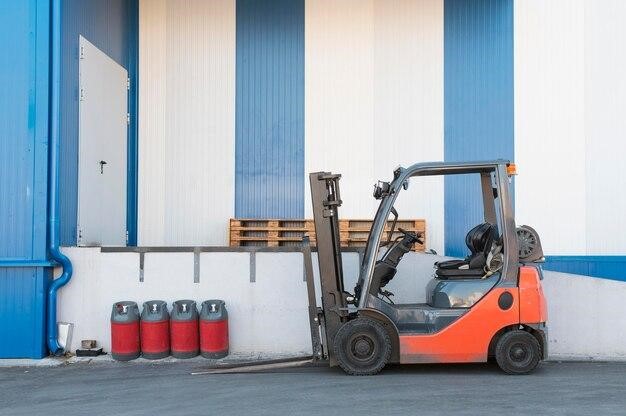Many warehouses are searching for cost-effective and environmentally friendly ways to operate. Electric forklifts provide a promising solution. In contrast to gas or diesel-powered equipment, electric stacker-trucks have significantly lower operating costs due to the cheaper price of electricity compared to fuel.
Electric fork hoists perform just as capable as internal combustion models. However, their total cost of ownership is lower over time due to fuel savings. These dual advantages of performance and affordability have made electrically operated fork hoists increasingly attractive for warehouse use.
This article will outline the key benefits that warehouses gain by powering their operations with electrically operated forklifts rather than traditional fueled equipment.
Lower Operating Costs Through Electricity Savings
One of the biggest advantages of electrically operated fork hoists is their significantly lower operating costs compared to gas or diesel models.
Electricity is generally cheaper to power an electric forfklift compared to fuel due to fluctuating fuel prices. This electricity savings alone can outweigh any higher upfront purchase price over the lifespan of owning the forklift. Many warehouses find their investment pays for itself within 2-3 years through lower utility bills.
As a warehouse owner, investing in an electrical forklift is like a long-term investment that is cost-effective and profitable.

Total Cost of Ownership Favors Electrically Powered Over Internal Combustion Models
While initial prices may be slightly higher, the total cost of ownership strongly favors electrical models when expenses are paid off over many years.
Not only do electrical forklift operators avoid ongoing fuel costs, but maintenance and repairs are much cheaper due to the simpler electrical motor versus a combustion engine requiring oil changes and tune-ups.
When factoring in both fuel savings and lower maintenance needs, the total expenditures are lower for electrical trucks in the long run.
Eliminating Tailpipe Emissions Reduces Environmental Footprint
In addition to cost savings, electric forklifts provide environmental benefits by eliminating tailpipe emissions entirely. Gas and diesel forklift operators emit carbon dioxide and other pollutants each time they are used. Click here to read about internal combustion engines.
By transitioning to electric equipment, warehouses can reduce their carbon footprint and work towards emissions reduction goals.
Electrically Powered Forklift Operators Provide Equivalent Performance for Warehouse Tasks
Contrary to perceptions, electric forklift operators deliver equivalent performance for warehouse tasks without compromise. Advances in battery technology provide adequate runtime before recharging during full work shifts.
Their powerful torque also allows instant acceleration and climbing without delays. Most modern electric models match or exceed the weight capacities of gas and diesel fork hoists.
Forklift operators have proven beneficial to warehouse employees who report similar productivity when using electric forklift trucks versus other options.
New Battery Technologies Extend Run Times Between Charges
Early concerns over electric forklift runtimes between charges are now largely moot due to advancements in battery life. New lithium-ion batteries provide longer operation per charge compared to older lead-acid types.
This extended duration matches or exceeds normal work shifts. Fork hoists can work all day before charging overnight. Find out how lithium-ion batteries work at https://www.energy.gov/energysaver/articles/how-lithium-ion-batteries-work.
Some batteries last multiple shifts before charging are needed. Battery swapping stations also allow continued usage while swapping in a fresh pack.
These technologies ease capacity worries and enable work to continue uninterrupted after transitioning from gas.
Looking for advanced forklift providers? Larsa Forklifts is a great option to look into. You can navigate their store for more via the map link below:
Quieter Operation Improves Safety and Worker Comfort
Electrically Powered forklift trucks run much quieter than loud, noisy internal combustion models. This quiet environment enhances both safety and worker satisfaction in warehouses. This is an advantage you can capitalize on as a warehouse owner.
Soft electric motor whines are far less distracting and hazardous than diesel engine noises. Quiet trucks such as this pose no danger of masking approaching vehicles or worker communications.
Lower noise pollution also reduces employee fatigue and improves workplace comfort.
With the associated safety, productivity, and employee wellness benefits, electric lift trucks’ lack of disruptive sound is an added advantage over other gas counterparts.
Minimal Maintenance Needs Reduce Downtime and Service Expenses
Electrically Powered forklift trucks have far simpler motors that require little scheduled maintenance. There are no oil changes, tune-ups, or repairs for leaky gaskets and hoses. Brakes and tires last longer due to startup torque control. Minimal service needs mean more uptime and productivity.
Electrically powered stacker-trucks spend less time in the shop and more time working. Mechanics have fewer repairs to perform as well. Fewer routine maintenance stops, and less fixing downtime lowers labor expenses significantly. Electric lift trucks prove more reliable with less costly servicing across their lifespan.
Electrically Powered Forklifts Are the Sustainable Choice for Powering Warehouse Needs
When factoring in all the advantages, electric stacker-trucks are the clearest sustainable choice for powering warehouses long-term. Their lower costs, emissions elimination, and equivalent performance offer financial and environmental benefits.
Electricity also involves fewer geopolitical risks than fuel supply and pricing fluctuations. Zero tailpipe emissions contribute directly towards lessening climate impact and improving local air quality too.
Considering these key details, electric forklifts comprise the most economically and ecologically sound solution for material handling needs now and into the future.
